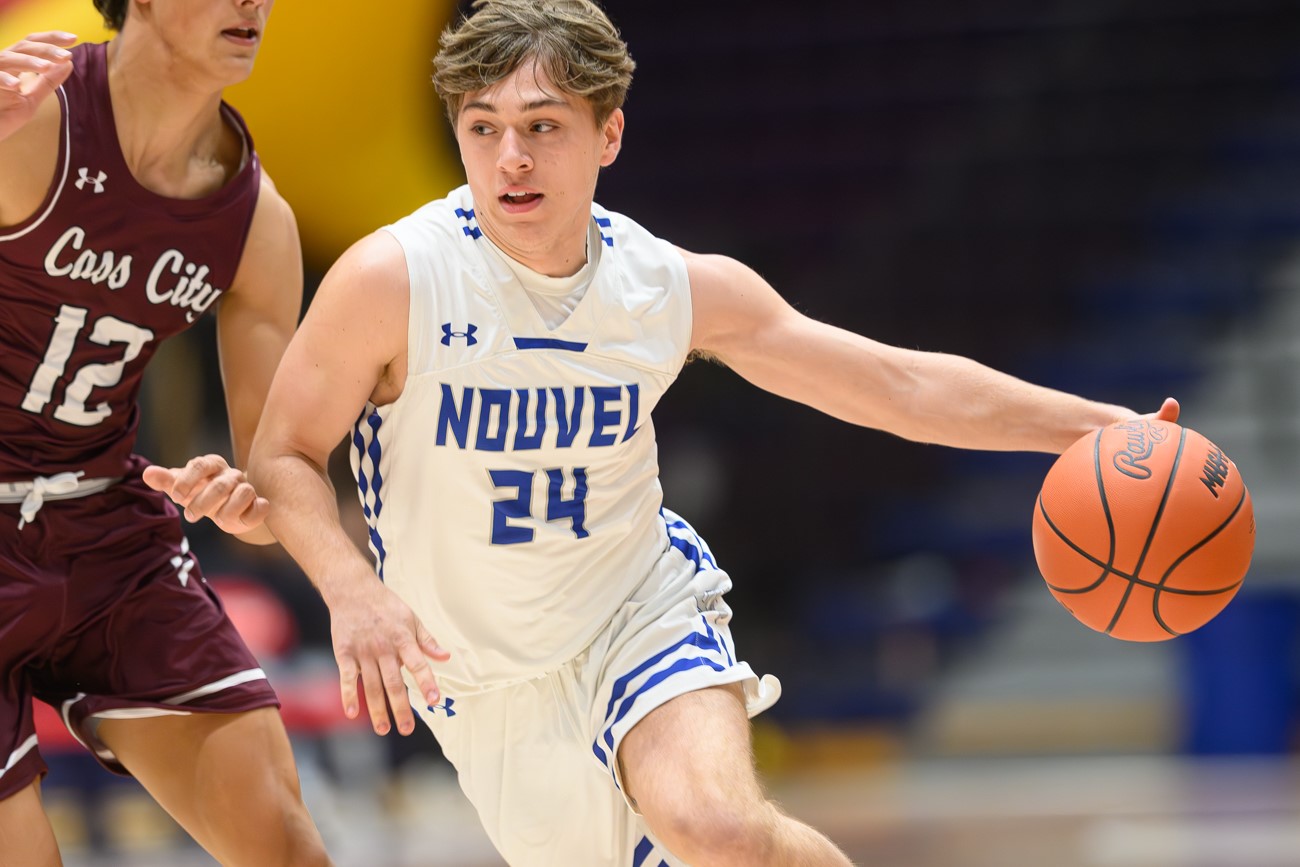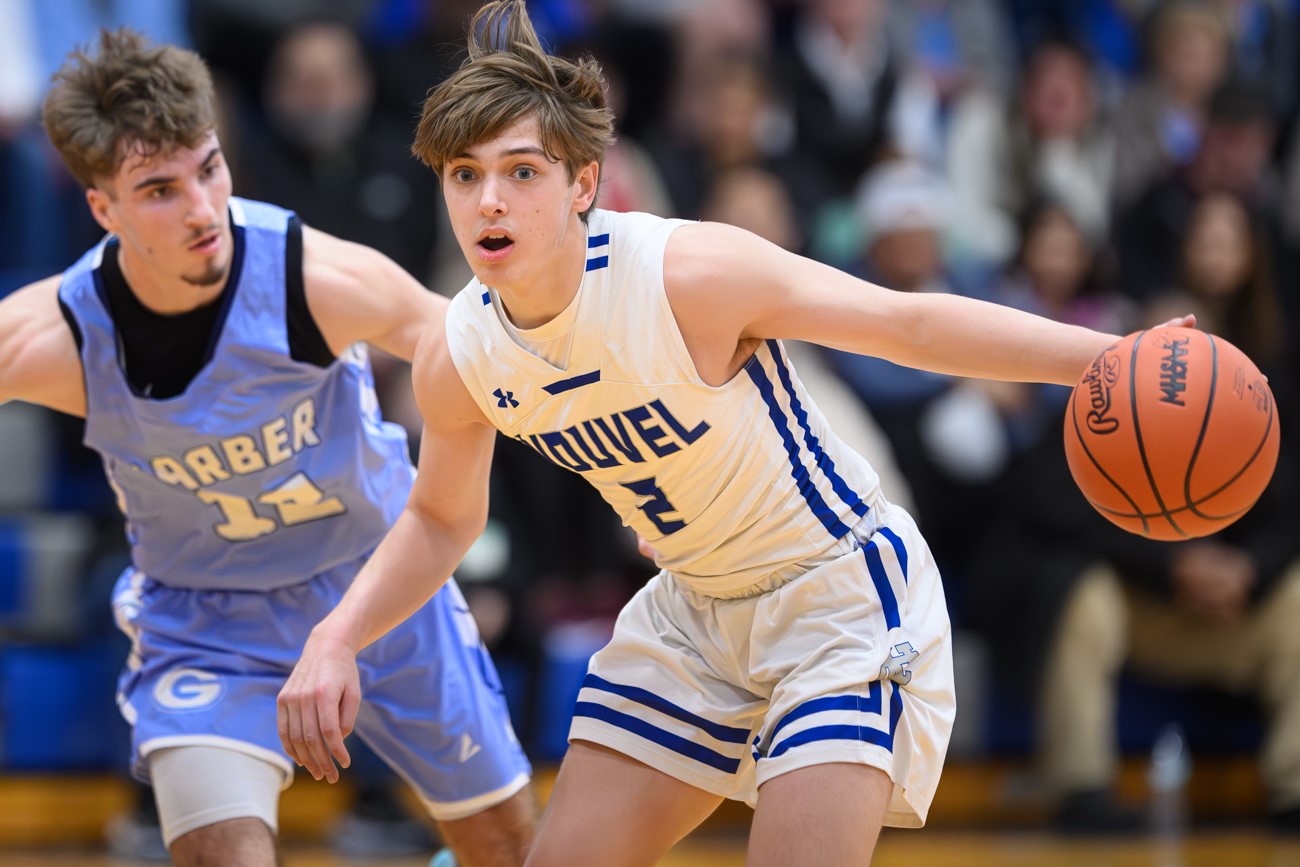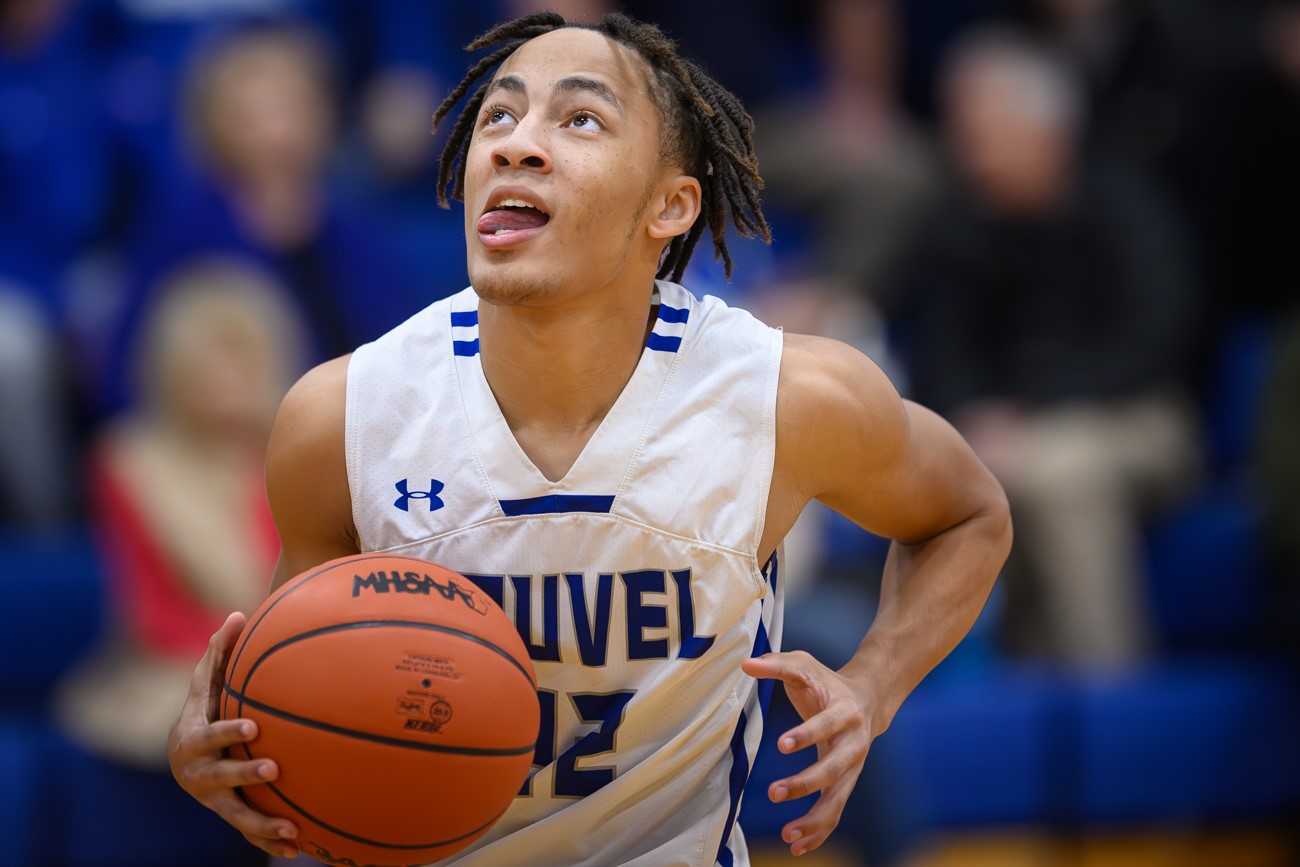
Detroit 'Longtime' Boys Coaches Down to Few
By
Tom Markowski
Special for Second Half
December 14, 2016
Gary Fralick considers himself one of the fortunate ones.
 Fralick, 66, is in his 32nd season as a head boys basketball coach. He retired from his teaching position in 2013. He started coaching at Redford Thurston in 1979, went to Royal Oak Kimball in 1984 and is in 23rd season as the head coach at Troy.
Fralick, 66, is in his 32nd season as a head boys basketball coach. He retired from his teaching position in 2013. He started coaching at Redford Thurston in 1979, went to Royal Oak Kimball in 1984 and is in 23rd season as the head coach at Troy.
Fralick might be lucky, but he is unquestionably rare. Fralick is believed to be one of three coaches in the Macomb/Oakland/Wayne area who has coached for more than 30 seasons.
There’s Dan Fife at Clarkston and Kevin Voss of Clinton Township Chippewa Valley, both of whom in their 35th seasons, all at the same school.
Another, Greg Esler at Warren DeLaSalle, is in his 30th season. He was the head coach at St. Clair Shores Lake Shore for seven seasons before going to DeLaSalle in 1994.
“We’re part of a dying breed,” Voss said.
It certainly appears so. Coaching longevity has taken on a different meaning recently. Twenty seems like a lot in these times, and in reality it is a long time. Twenty years or so ago, 20 years was normal. There’s a new normal, and 20 or 25 years isn’t it.
Many factors have contributed to this change. A person’s personal and family life often don’t coincide with the demands of coaching basketball. The responsibilities that come with coaching have increased. Some coaches say that to be an effective coach, it can be a 10- or 11-month job.
Two factors are at the forefront, and they are both financial. Coaches used to be educators as well as coaches. Yes, coaching can be viewed as teaching on the court, but at one time teaching in a classroom and coaching used to go hand in hand.
 Then there’s the subsidy coaches receive. It varies from school district to school district. Some make $4,000 a season, others can make $7,000. And it also costs money to run a program; unless the coach receives financial help from a booster club or parents, the money he or she receives begins to dwindle.
Then there’s the subsidy coaches receive. It varies from school district to school district. Some make $4,000 a season, others can make $7,000. And it also costs money to run a program; unless the coach receives financial help from a booster club or parents, the money he or she receives begins to dwindle.
But the most important factor is time.
“A tremendous amount of time is devoted to watching DVD or tapes,” Fralick said. “I know I’m dating myself with saying that. The point is, you’re watching a lot. There’s more scouting. And you don’t get paid much. Why don’t they stay as long as they used to? They get burned out. They want to spend more time with their families.
“You don’t see as many of the young coaches stay. Coaches don’t have the ambition to coach a long time. It’s not a profitable job. I don’t know what other coaches make. We used to compare what we made. Not anymore.
“Thirty years or more? I don’t see it happening. There’s the dual job thing. Things have changed. To me, it’s been a great job.”
To compensate for being away from home, Fralick brought his family with him. Sort of. He coached his son Gary, Jr., and Tim. Gary, a 1996 Troy graduate, played for his father his junior and senior seasons and Tim, a 1999 graduate, played four seasons on varsity. Fralick said he was even more fortunate to coach both on the same team (during the 1995-96 season).
Then there’s his wife, Sharon, who remains the scorekeeper.
“I’ve always had a passion for coaching and teaching,” Fralick said. “I love the game of basketball. I love the kids. There’s never a dull moment. It’s been a great ride.”
Vito Jordan has been around basketball all of his life. His father, Venias Jordan, was the boys head varsity coach at Detroit Mackenzie and Detroit Mumford before stepping down as a head coach only to return to the bench assisting his son the last six seasons.
Vito Jordan, 31, became a head coach at Detroit Osborn when he was 24. He started his coaching career the year before as an assistant to Henry Washington at Macomb College. Jordan went to Detroit Community after one season at Osborn and guided Community to its only MHSAA Finals appearance (Class B, 2013). He’s now in his fourth season as the head coach at Detroit Renaissance.
“I followed my father all of my life,” Jordan said. “I knew what I wanted to do when I was in college (Alma College). This is what I want to do the rest of my life.”
It’s different in Detroit. Schools close. Job titles change. Jordan, for instance, teaches at the Academy of Warren, a middle school in Detroit. It’s a charter school, not within the Detroit Public School system, therefore he receives his pay from two separate school systems (Renaissance is in the DPS).
There is a distinction. In some school systems coaches will receive a percentage – let’s say for argument sake, 10 percent – of their teaching salary to coach. Let’s say a person makes $60,000 a year to teach. He or she would then receive $6,000 to coach. If you coach two sports, that’s $12,000.
 Jordan is not privy to such a contract. Each job is separate. Jordan loves to coach, and he understands he must be a teacher to earn a decent living, and he’s content to continue on the path he is following. But he also knows that to make a good salary just coaching one must move on to the collegiate level like others have done.
Jordan is not privy to such a contract. Each job is separate. Jordan loves to coach, and he understands he must be a teacher to earn a decent living, and he’s content to continue on the path he is following. But he also knows that to make a good salary just coaching one must move on to the collegiate level like others have done.
“When there were coaches like my dad, Perry Watson (Detroit Southwestern), Johnny Goston (Detroit Pershing) and others, they all worked in the (Detroit Public) school system. Everyone was teaching. That was your career. None of them had aspirations of being a college coach. Not even Watson. Now everyone isn’t in the teaching profession. Maybe they do have a degree and maybe they don’t. The point is, most aren’t teachers. I can count on one hand those (in Detroit) who have their teaching certificate and coach.”
Jordan noted such successful PSL coaches like Derrick McDowell, Steve Hall and Robert Murphy who left high school to pursue a coaching career in college. Murphy guided Detroit Crockett to the Class B title in 2001 and is now the head coach at Eastern Michigan. McDowell has had two stints as a collegiate assistant coach, most recently at EMU. He’s since returned to coach at Detroit Western. Hall coached Detroit Rogers to three consecutive Class D titles (2003-05) before going to Duquesne University and Youngstown State as an assistant coach. Hall returned to Detroit last season and is in his second season as head coach at Detroit Cass Tech.
Jordan said they left high school to challenge themselves professionally, among other considerations. Voss said there are variables that influence how long a person lasts, in one school district or in coaching in general, that didn’t exist 20 years ago.
“Athletics have become pervasive in high school,” he said. “The whole booster situation you find in college is here. You can be winning but not winning enough. It’s a trickle down affect.
“Coaches complain about parents. Parents complain about playing time. High school sports is not as pure as it once was. Winning is way more important now. Now a coach comes in with a three-year window. You can have one or two down years, and the third you’d better win.
“Then there’s the pressure on your family. I’ve been lucky. My wife and I have had the players over for team dinners. We create a family atmosphere. It’s a change of society. I don’t envy the young coaches coming in.”
Community involvement has always been a priority for Voss. To keep a hand on the pulse, Voss heads the elementary basketball program within the Chippewa Valley school district. Games are held on Saturdays, and approximately 750 students take part.
“You have to have the right fit,” he said. “I’m in the right spot. You coach for different reasons when you get older. I’m enjoying the game. There’s a different level of satisfaction.”
 Tom Markowski is a columnist and directs website coverage for the State Champs! Sports Network. He previously covered primarily high school sports for the The Detroit News from 1984-2014, focusing on the Detroit area and contributing to statewide coverage of football and basketball. Contact him at [email protected] with story ideas for Oakland, Macomb and Wayne counties.
Tom Markowski is a columnist and directs website coverage for the State Champs! Sports Network. He previously covered primarily high school sports for the The Detroit News from 1984-2014, focusing on the Detroit area and contributing to statewide coverage of football and basketball. Contact him at [email protected] with story ideas for Oakland, Macomb and Wayne counties.
PHOTOS: (Top) Troy boys basketball coach Gary Fralick, left, is in his 32nd season coaching. (Middle) Detroit Renaissance boys coach Vito Jordan is following in the coaching footsteps of his father, Venias. (Below) Chippewa Valley boys coach Kevin Voss, left, is in his 35th season at his school. (Top and below photos courtesy of C&G Newspapers; middle photo courtesy of Detroit Public School League.)

Yeager Twins, Strong Senior Class have Nouvel on Track to Meet High Expectations
By
Paul Costanzo
Special for MHSAA.com
January 24, 2024
Donny Yeager and his Saginaw Nouvel Catholic Central boys basketball teammates certainly weren’t happy with their 0-3 start to this season, even if they weren’t at all worried about what it meant for their future.
 But now, with the Panthers in the midst of a nine-game win streak, they’re even able to see the good in those early defeats.
But now, with the Panthers in the midst of a nine-game win streak, they’re even able to see the good in those early defeats.
“We knew coming into the season that the first three games were going to be really tough games, especially at the beginning of the season,” Yeager said of the opening stretch against Essexville Garber, Pewamo-Westphalia and Cass City. “So we knew there was nothing to worry about, and that we had the whole season ahead of us. We knew practices were going to get us ready for the next one. I definitely think we learned a lot about our group. We learned about the determination and perseverance that our guys bring to the table.”
That determination and perseverance have the Panthers back on track in what was expected to be a special season – and in many ways already has been – following a Regional Final berth a year ago.
Not only is Nouvel 9-3 ahead of its game Friday night against St. Louis, but MJ Yeager, Donny’s twin brother, set the school’s career scoring record earlier this month. Donny Yeager, meanwhile, is less than 30 points away from joining his brother in the school’s 1,000-point club.
“We have a lot of experience back,” said Nouvel coach Mike Kessler, who is in his ninth season in charge of the program. “We try not to look ahead, and we’re trying to take it one step at a time. And I think we had to have a lot of conversations with our guys about just relaxing. We know expectations might be high, but let’s do what we’ve done for years. We have a really hard-working group this year, and they needed to just trust themselves.”
A lot of those expectations came from the return of the Yeager twins, as both MJ – a four-year starter – and Donny – a three-year starter – are in their fourth year on the varsity. Classmate Preston Otter is also in his third year as a starter.
 The Yeagers are both 5-foot-10 guards who can handle the ball and shoot from distance, while Otter is a 6-4 forward that Kessler called “a crazy good athlete.”
The Yeagers are both 5-foot-10 guards who can handle the ball and shoot from distance, while Otter is a 6-4 forward that Kessler called “a crazy good athlete.”
“Their work ethic is second to none; it really is,” Kessler said. “They’re everything you want from seniors. They exemplify what we want our program and our school to be about.”
In total, there are seven seniors on the roster, including also Anthony Carrasquillo, Tristen Elizalde, Matthew Hartwell and Brandon Murphy.
Being that senior-laden helped the team through that early bump in the road, Kessler said.
Having that experience also doesn’t hurt when it comes to adjusting to whatever style of play a game may take on. Behind its Big 3, Nouvel can certainly score, averaging 65.3 points per game on the season and 70 ppg during their win streak.
But Nouvel also can fall back on its defense those nights when shots aren’t going down, which the Panthers feel will be key to a potential postseason run in Division 4.
Kessler said a pair of wins during the streak – 69-60 against Imlay City on Dec. 29 and 73-31 against Standish-Sterling on Jan. 16 – showed his team’s versatility.
“Standish has been good in our conference for the last four to five years,” Kessler said. “We out-rebounded them and held them to only 31 points. I thought we were a gritty, tough team that night. The Imlay City game, we won with our skill. We were tough, too, but we spread them out and we hit 3s. We were able to guard their 6-7 wing with Tristen Elizalde – he’s 5-11. He’s tough as nails. He can guard any position on the floor.”
As it’s all coming together for the Panthers as a team, the individual milestones also are being reached.
MJ Yeager set the school scoring record in that game against Standish, passing the previous mark of 1,302 set by Nouvel legend Preston Murphy during the early 1990s. Murphy is currently on Nate Oats’ coaching staff at Alabama and played collegiately at Rhode Island.
 “I actually know (Murphy),” Yeager said. “He came over to my house and I played basketball with his kid.
“I actually know (Murphy),” Yeager said. “He came over to my house and I played basketball with his kid.
“(The record) was a great accomplishment and a great feeling. I’ve always been a competitor, so achieving stuff like that, it’s a good feeling.”
The record began to come into focus for Yeager when he crossed the 1,000-point threshold during his junior season.
One thing that’s stuck out to him in hitting both marks is the reaction of Donny. He said he can’t wait to experience something similar when Donny crosses 1,000 points, maybe as soon as Friday.
“I feel like that’s going to help both of us realize the hours we put in together every single day have paid off,” MJ Yeager said. “I heard him talking about how great of a brother it made him feel like, and I’m hoping I can feel that when he achieves it.”
Donny echoed that sentiment.
“Honestly, to see him achieve 1,000 last year and the school record this year, it was really rewarding for me, as well,” he said. “We’ve grown up together, and I want to see him do good in everything he does. It’s a blessing to be able to do this with him.”
When it comes to his own potential milestone, Donny said it would mean a lot to share that honor with his brother.
But he was quick to point out the credit goes beyond the Yeager household.
“I wouldn’t be able to do it without my supporting cast,” he said. “None of it would be possible without them. It’s really exciting. It shows what hard work and dedication can get you. And it’s good for all the young kids coming up to see that.”
 Paul Costanzo served as a sportswriter at The Port Huron Times Herald from 2006-15, including three years as lead sportswriter, and prior to that as sports editor at the Hillsdale Daily News from 2005-06. He can be reached at [email protected] with story ideas for Genesee, Lapeer, St. Clair, Sanilac, Huron, Tuscola, Saginaw, Bay, Arenac, Midland and Gladwin counties.
Paul Costanzo served as a sportswriter at The Port Huron Times Herald from 2006-15, including three years as lead sportswriter, and prior to that as sports editor at the Hillsdale Daily News from 2005-06. He can be reached at [email protected] with story ideas for Genesee, Lapeer, St. Clair, Sanilac, Huron, Tuscola, Saginaw, Bay, Arenac, Midland and Gladwin counties.
PHOTOS (Top) Nouvel Catholic Central senior guard MJ Yeager drives past a defender during a game against Cass City at the O'Neal Classic Tournament on Dec. 2 at Saginaw Valley State University. (Middle) Twin brother Donny Yeager drives past an Essexville Garber defender during his team’s Nov. 28 opener. (Below) Panthers senior Matthew Hartwell drives into the paint against Michigan Lutheran Seminary on Friday. (Photos by Michael Kolleth Photography.)

